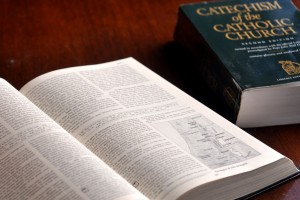Catholics and Private Revelation Part II: The Voice of Tradition
 Recently, there was some discussion on the topic of private revelation in an article recently posted to Catholic Lane. I want at this time to point to some additional information that is not commonly known which will help shed some light on why the spiritual writers of the Catholic tradition as well as the Catechism of the Catholic Church take the approach they do to private revelation. To start with, let us take a look at what Pope Benedict XIV wrote in his highly influential multi-volume Treatise on the Beatification and Canonization of the Servants of God{1} on how to approach these matters:
Recently, there was some discussion on the topic of private revelation in an article recently posted to Catholic Lane. I want at this time to point to some additional information that is not commonly known which will help shed some light on why the spiritual writers of the Catholic tradition as well as the Catechism of the Catholic Church take the approach they do to private revelation. To start with, let us take a look at what Pope Benedict XIV wrote in his highly influential multi-volume Treatise on the Beatification and Canonization of the Servants of God{1} on how to approach these matters:
“To [private] revelations, even those approved, we must not and cannot give the assent of Catholic faith, but only that of a human faith, according to the rules of prudence, as these indicate that such revelations are probable and piously credible.” [Pope Benedict XIV: De Servorum Dei Beatificatione et de Beatorum Canonizatione Bk. III, c. 52-53; thus (ch. 53, n. 15)]
Another rendering of this judgment is as follows:
“‘It is not obligatory nor even possible to give them the assent of Catholic faith, but only of human faith, in conformity with the dictates of prudence, which presents them to us as probable and worthy of pious belief’ (De canon., III, liii, xxii, II)”
The general understanding of these matters was explained in this fashion by the one-time Vatican Librarian under Pope Pius IX:
“Everyone knows that we are fully at liberty to believe or not in private revelations, even those most worthy of credence. Even when the Church approves them, they are merely received as probable and not as indubitable. They are not to be used as deciding questions of history, natural philosophy, philosophy, or theology which are matters of controversy between the Doctors.” [Cardinal Jean Baptiste Francois Pitra]
If supporters of private revelations want to make the argument that the above instruction is not a part of Pope Benedict XIV’s papal magisterium, they may well be right about that{2} but observe how the principles set down by Benedict XIV and elaborated on by Cardinal Pitra have been embodied in subsequent magisterial texts. There was in order of chronology a Decree from the Sacred Council of Rites under Pope Pius IX published on May 2, 1877 that stated the following:
“Such apparitions or revelations were neither approved nor condemned by the Apostolic See, but only permitted as things to be believed with a merely human faith, according to the tradition they bear, confirmed by suitable testimonies and monuments.”
The reader is asked to notice how the instruction from 1877 bears the unmistakable stamp of Pope Benedict XIV’s earlier (circa 1743) exposition on the matter! Furthermore, Pope Pius X in his Encyclical Letter Pascendi Dominici Gregis had this to say about pious traditions of the sort that private revelations fall under:
“When a judgement is to be made about pious traditions, one needs to remember that the Church uses such great prudence in this matter that it does not permit such traditions even to be put in writing without great caution and only if the statement of Urban VIII is placed as a preface. Even if this is done correctly, the Church does not assert the truth of the fact but, unless human arguments for believing it are lacking, simply does not forbid its being believed. So, thirty years ago, the Sacred Council for protecting legitimate rites declared (Decree of May 2, 1877)…” [Pope Pius X: Pascendi Dominici Gregis September 8, 1907 (ASS 40 [1907], 649)]
In short, no private revelation is of required belief -it is purely to the discretion of the individual using rules of prudence. Consequently, private revelation as they involve mere human faith cannot be used to decide questions pertaining to philosophy, theology, or any other field of endeavour. Therefore, any Catholic who tries to do this is deserving of no small rebuke.
In closing, reflect upon these words of the former Assessor of the Holy Office under Pope Pius XII and later Prefect of the Holy Office under Pope John XXIII and Pope Paul VI critical of those who focus too much on private revelations to the detriment of matters of Faith:
“The faithful repair in vast crowds to places where visions and wonders are supposed to have taken place… People who are ignorant of the first words of the Creed set themselves up as ardent apostles of religious belief and practice.” [Cardinal Alfredo Ottaviani (circa 1951)]
Notes:
{1} This is *the* most significant source of the past two hundred and fifty years influencing the beatification and canonization process of servants of God.
{2} See footnote one.

